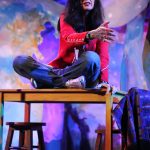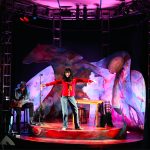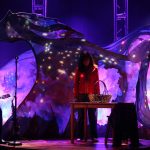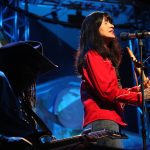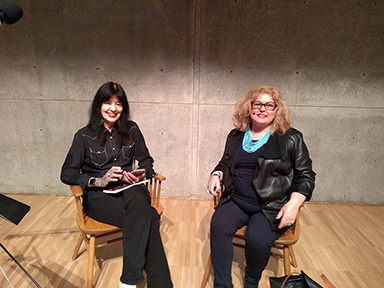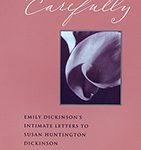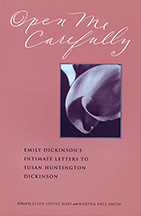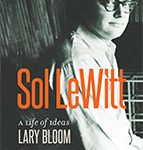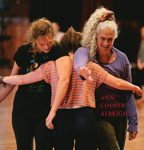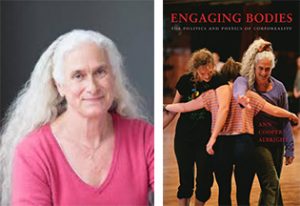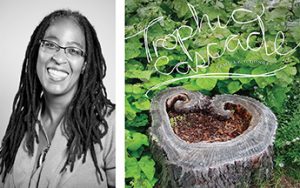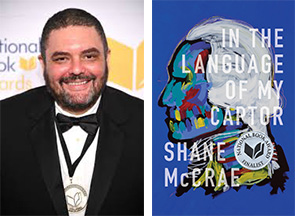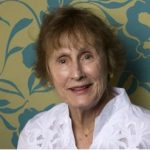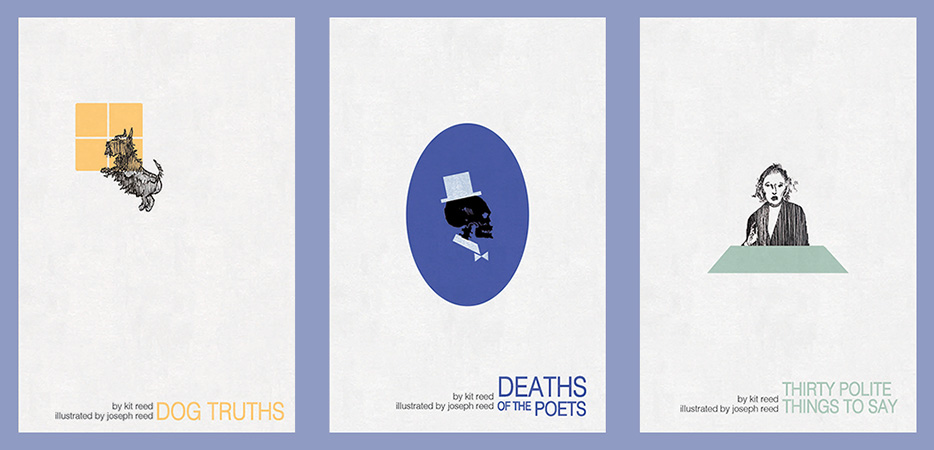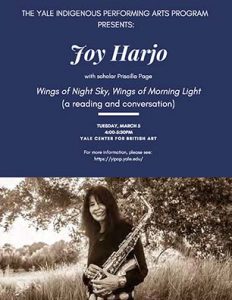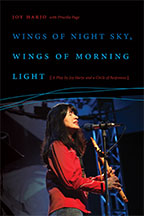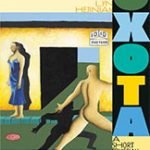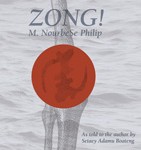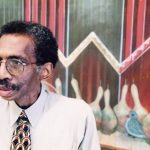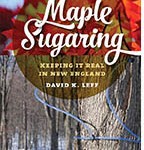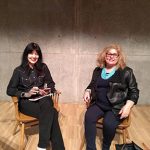
Priscilla Page was co-editor and contributor to Wings of Night Sky, Wings of Morning Light: A Play by Joy Harjo and A Circle of Responses. The play was inspired by Harjo’s desire to see Native Americans accurately depicted on the stage, in the face of inaccurate contemporary depictions found in the likes of Bloody Bloody Andrew Jackson and Cry, Trojans!, in addition other recent plays. As Mary Kathryn Nagle points out in her introductory essay: “In contrast to the majority of contemporary Native representation onstage, the Native protagonist of Wings does not grunt incoherent sounds, nor does she portray the loss of her Muscogee ancestral homelands as a joke in a modern day rock musical.”
Priscilla Page is a writer, dramaturg, senior lecturer in the Department of Theater and coordinator for the Multicultural Theater Certificate at the University of Massachusetts Amherst, and a member of the Latino Theater Commons and Literary Managers and Dramaturgs of the Americas (LMDA). She served as the program curator at New WORLD Theater and managed the Asian American Women Playwrights Archive for five years.
Page’s dramaturgy works include My Bronx, written and performed by Terry Jenoure, sash & trim, written and performed by Djola Branner and directed by award winning actress Laurie Carlos, Changing the Air, written and directed by Ingrid Askew, and Lydia on the Top Floor, also written and performed by Terry Jenoure and directed by Linda McInerney. Page also contributed to widely published playwright Migdalia Cruz’s essay “My World Made Real,” a part of Cruz’s anthology, El Grito Del Bronx. She earned her BA at California State University Hayward, and her MFA in dramaturgy at University of Massachusetts, Amherst.
Question & Answer with Priscilla Page
Q Tell us about what led you to become a dramaturg?
A I have always loved theater and performance. I took dance classes with my cousins when I was really young and then I was in the choir and in plays in high school. Like many young people, I wanted to move to New York and become an actor. I had big dreams for a while. In college, I chose to have a child and then redirected my path in life. I finished college with an emphasis on costume design and an interest in dramaturgy. Right after college, I was able to work as an intern as dramaturg at UC Santa Barbara where my love for theater research continued to grow. That experience led me to study dramaturgy at UMASS Amherst where I earned my MFA in 2002. There are many facets to dramaturgy and dramaturgs perform a number of different functions that include research, translation, education, audience engagement, and new play development. As a dramaturg, I am most interested in working with writers (playwrights and poets) on new plays/performance texts. Laurie Carlos, my mentor and art-mother, helped forge what is known as the jazz aesthetics in theater and I see her influence on my work clearly. I appreciate theater that blends forms and that pushes creative and political boundaries. Joy’s play does these things and shows the readers a path toward self-actualization and healing.
Q What do you envision, for the future of Indigenous Theater and Indigenous Performance?
A I envision respect, understanding, and resources. We chose to place Mary Kathryn Nagle’s essay first in the book because she lays out such a clear statement about the absence AND the distortions of Native American people on the American stage that is both historical and ongoing. Native American artists have rich and complex stories to tell. We need audiences to listen and we need resources to cultivate new voices and spaces for Native American writers and performers.
Q How did you come to work on Wings of Night Sky, Wings of Morning Light, a book about Indigenous Theater?
A I met Joy in 2003 when she performed as part of the Global Women’s History Project at Westfield State College. My dear friend and incredible poet Magdalena Gomez also participated in that event and told me about it. I have loved Joy’s poetry since I first read it as a young woman in college in California in the 1990s. At the time that Joy and I met, I was having a hard time emotionally because my Aunt Linda had passed away and recently. It was sudden and it deeply affected my mother. I wasn’t able to travel home and felt very sad and lonely. I had never seen pictures of Joy but I knew many of her poems: “She Had Some Horses”, “Remember”, “Woman Hanging From the 13th Floor Window”. I expected to be moved by hearing her but what was totally unexpected was how I felt when I saw her. She looks just like my Aunt Linda. I ended up sitting in the back of the room and weeping through the entire reading. When it was over, I couldn’t bring myself to leave the space. In fact, I moved closer to the stage without really wanting to talk to Joy. I only wanted to be close to her as I grieved. I am sure she sensed that something was going on with me because I think I ended up being the only person in the auditorium. I vividly recall Joy sitting next to me and starting a conversation with me. I told her that she looked like my aunt and she simply said, “Tell me about her.” I shared with her that I knew a little about my family’s heritage as Native Americans but that my mom and her siblings were virtually silent about that part of themselves. We come from a very small tribe that endured incredible violence in Northern California, the Wiyot Tribe. Joy knew of this tribe and their history. She had even done work with them and visited their land. I had a copy of her poem “Remember” with me and I asked her to sign it. She wrote, “I hope this poem helps you find your people.”
I share part of this story in the book and with you now because it did help me continue to ask questions and do research; it’s a journey that I am still taking. I also learned from Joy and through my research that my family’s silence was really a form of self-preservation. White settlers intended to completely wipe them out and enacted a series massacres with the most horrific one taking place on Indian Island in Humboldt Bay on February 26, 1860. After that the surviving members went underground, joining other tribes nearby or inter-marrying. My grandmother Lila Keysner was born in 1910 and the word “half-breed” is listed on her birth certificate. Her grandparents would have lived during the time of the massacres. The only detail that I really know is that she lived on a reservation until she married my grandfather Raymond Chavarin, a Mexican man. They lived in Oakland, CA, and had nine children together.
After meeting Joy in 2003, I attended the reading of Wings of Night Sky, Wings of Morning Light at the Public Theater in 2009. I remember really loving the idea of telling the story of Redbird with poetry and music. It’s the perfect form for Joy because she has led bands over the years and because she often plays her saxophone at her poetry readings. In 2011, I was able to work with my colleague Professor Laura Furlan at UMASS Amherst and we hosted Joy and Larry Mitchell for a short residency that included a performance, a workshop version of “Wings” and the radio interview that I conducted with Joy and Ron Welburn, a leading figure in Native Studies and an expert on jazz. I included parts of that interview in my essay in the book as well. It was after that residency that Joy asked me to work with her on the book project. It actually took us a while and there were some starts and stops with shape of the book and the contributors. I am very happy that we worked with Mary Kathryn Nagle who wrote a strong and compelling essay and that I was able to interview both Randy Reinholz, a Native theater director and producer who I know and admire as well as Rolland Meinholtz who was very generous with his time and his recollections. And the book is stunning! I love the design of it and the inclusion of the production photos.
Photos from a production of Wings of Night Sky, Wings of Morning Light.
(Click on the photos to expand.)
